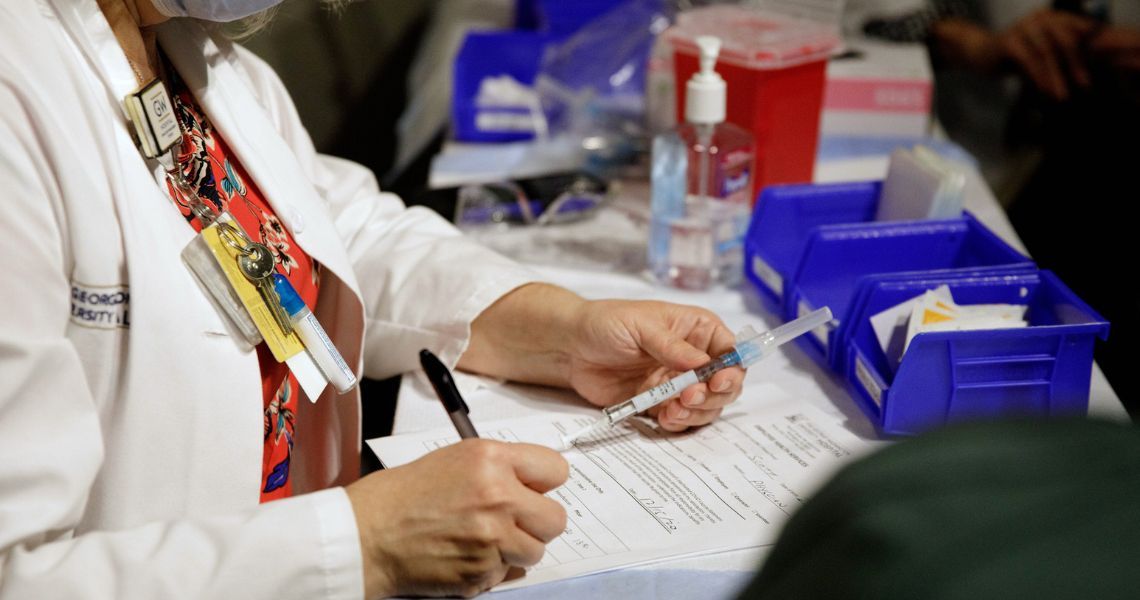Days ahead of the start of World Immunization Week, April 23–29, the Centers for Disease Control and Prevention recommended on Wednesday that adults 65 and older and those with weakened immune systems receive another dose of the reformulated COVID-19 booster. It’s a timely reminder that vaccines can protect you and your loved ones from serious diseases, such as HPV-related cancers, measles, polio, shingles, and COVID-19. Michael G. Knight, MD, primary care physician and associate chief quality and population health officer at the George Washington University (GW) Medical Faculty Associates (MFA), explains why vaccines are so important and how you can talk to your doctor about any concerns.
Q. What are the most common immunizations that patients, including children, get?
Knight: There are a number of immunizations that patients get. A lot of the immunizations have to do with their age or any health condition they may have that decreases their immune system or affects how well their immune system works. For adults, we know that the tetanus vaccine is recommended every 10 years, and there’s the annual flu shot. When individuals hit the age of 50, we start thinking about the shingles vaccine. At age 65, we start thinking about the pneumonia vaccine for the average adult. For individuals who have other conditions, they may have the pneumonia vaccine, as well as some others, earlier.
For kids, there are several vaccines, including hepatitis, pertussis, tetanus, and measles. There’s a larger schedule of vaccines, but the best thing is having a primary care provider who will keep track of these for you. That’s why it’s important to check in with your provider every year for your annual physical. That is when we usually review what vaccines you’ve had, what you may be due for, and what you should be considering.
Q. What would you tell people who are hesitant about vaccines, either for themselves or for their children?
Knight: The first thing is I wouldn’t immediately tell them anything; I would actually ask them why they are hesitant or why they have concerns. I like the term “concerns.” When we fully understand people’s concerns, we can work to answer their questions and help them feel more comfortable about taking vaccines that we know are effective in preventing disease or reducing the severity of disease.
So, number one is understanding why someone has a concern. Oftentimes, it may be based on misinformation, it may be based on someone else’s experience, what they heard, or what they saw online. A conversation with a trusted provider is a powerful intervention to overcome that and allow someone to make a personal decision to accept a vaccine.
Q. Have you found in your experience that when you talk with a patient, they usually feel better and more confident about getting a vaccine?
Knight: Definitely, because we have to understand that trust is a fundamental part of a patient-and-provider relationship. Most of my patients are not going to know as much about their medical conditions or potential treatments as I do, because I’m a physician. They have to trust that I’m going to recommend things that are actually going to be safe and effective for them. They may never fully understand how it works, but I try to break things down in an understandable way so they have a general idea of what impact it’s going to have on their health.
Q. What vaccine-related myths have you heard repeatedly?
Knight: There are a large number of myths about vaccines, and some of them are based on facts that have been distorted. I think that’s the reality of misinformation. It’s not just a random fact that people believe; oftentimes, a little bit of truth is mixed in with a little bit of misinformation. That’s what we see.
For example, many years ago, most of our vaccines were an inactivated form of a virus or bacteria that was given to people to help immunize them against a pathogen, which is a bacterium, virus, or other microorganism that can cause disease. Now, that vaccine, because it also had the pathogen, even if it was weakened, could have the rare ability to infect the person. So, when we think about things like the original polio vaccine, that was a live vaccine. It helped hundreds of thousands of people, but also some people got actual polio from the vaccine. Most vaccines today do not have a live virus or bacteria in them. Most vaccines today have what you can think of as a piece of protein that is found in that virus or bacteria.
Q. How common are side effects from vaccines, and what do they look like?
Knight: Side effects vary from vaccine to vaccine, so we have to understand the type of vaccine, how it’s eliciting a response, and the population that’s going to receive it. We also have to separate side effects from what we expect because the immune system is reacting. A vaccine is only effective if your immune system reacts to it.
If you have tenderness at the site of injection, that shows your immune system is going to the area where the vaccine was injected and reacting to it. Having a sore arm is classified as a side effect, but it actually shows that your immune system is working. It’s the same with low-grade fevers, chills, and achy muscles; a lot of those symptoms are signs that your immune system is actually working.
When we think about rare side effects, like effects on the nervous system, such as Guillain-Barre syndrome or inflammation around the heart in some younger people who received a COVID-19 vaccine, those are rare side effects that are not part of what we expect from an immune response. The good news is that every vaccine, even those that have emergency use authorization, has to be reviewed for risk and benefit. If it is found that a vaccine has more risk for harm than benefit, it is not going to be approved.
Q. Why is it important to get immunized and to get your children immunized?
Knight: If you want to be healthy, if you want to keep your children healthy, you have to think about preventable infectious disease. If there’s a vaccine available, then that’s a wonderful opportunity to protect yourself. There’s no other protection, unless you take the chance that your immune system will be able to fight the pathogen effectively to prevent severe illness. Unfortunately for many individuals, depending on the pathogen, that may not be the case.
Q. How do physicians at the GW MFA help people get immunized?
Knight: Most of the time, vaccinations happen during an annual physical, when we focus on preventive health. All of our physicians and advanced practice providers will discuss necessary or needed vaccines for our patients. We also have the vaccines in-house, so when patients make a decision, they can get it right there. In the office, we educate one on one, and outside of the clinic, we educate through news and social media. We also go out into the community to educate patients about the effectiveness as well as the safety of vaccinations.




